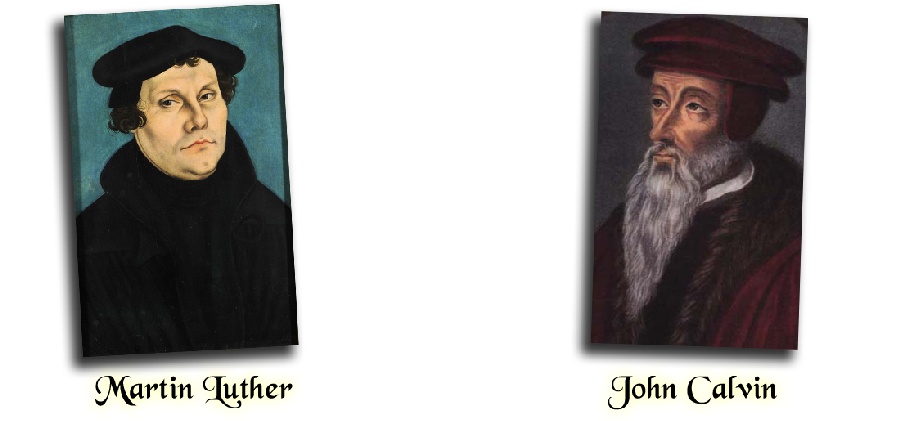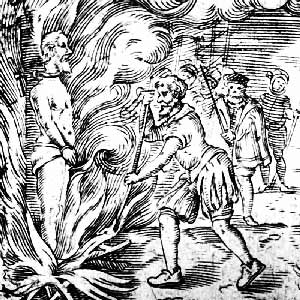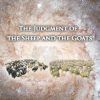Martin Luther and John Calvin, the fathers of the Protestant Reformation, taught that salvation was by grace through faith in Jesus Christ, and that any who lack such saving faith are condemned to eternal damnation, regardless of whether they ever had the chance to hear the gospel…
That means that uncounted millions of men, women, and children have been born, lived their lives, and died without one shred of hope for mercy in the judgment, simply because they did not live in the right place or time to hear the Christian gospel. They were all doomed from the start to everlasting torment in “hell.”
But to Calvin and Luther, it is not simply a matter of chance — being born in the wrong place and time. According to them, most of humanity is condemned to eternal damnation for the crime of being chosen by God to spend eternity in hell. If this does not make any sense to you, it is because their teaching actually does not make any sense. We would not even expect you to believe it if we had not read it ourselves, so we want you to see these men’s own words:
“We call predestination God’s eternal decree, by which He determined with Himself what He willed to become of each man. For not all are created in equal condition, rather eternal life is foreordained for some, eternal damnation for others. Therefore, as any man has been created to one or the other of these ends, we speak of him as predestined to life or to death.”
[John Calvin, “The Institutes of the Christian Religion,” Book III, xxi, 5.]
“Of course, this seems to give the greatest offense to common sense or natural reason, that God, who is proclaimed as being so full of mercy and goodness, should of His own mere will abandon, harden, and damn men, as though delighted in the sins and the great eternal torments of the miserable. It seems iniquitous, cruel, intolerable to think thus of God. It has given offense to so many and many great men down the ages. And who would not be offended? I myself have been offended at it more than once, even unto the deepest abyss of despair, so far that I wished I had never been made a man. That was before I knew how healthgiving that despair was and how near it was to grace.”
[Luther and Erasmus, “Discourse on Free Will,” page 131 (1961); Luther’s work is “The Enslaved Will”]
Many insightful men have seen the horror of this teaching down through history, how it makes human life meaningless and God heartless. One of the men with clearest insight was the author of the American Declaration of Independence, Thomas Jefferson. His words ring out still with crystal clarity:
…the demoralizing dogmas of Calvin… that good works, or the love of our neighbor, are nothing; that faith is everything and the more incomprehensible the proposition the more merit in its faith; that reason in religion is of unlawful use; that God, from the beginning, elected certain individuals to be saved and certain others to be damned, and that no crimes of the former can damn them, no virtues of the latter save.
Thomas Jefferson saw these men for what they were:
[Thomas Jefferson, “The Jefferson Bible,” page 342 (1964)]
“Verily I say these are the false shepherds foretold as to enter not by the door into the sheepfold, but to climb up some other way. They are mere usurpers of the Christian name, teaching a counter-religion made up of the deliria of crazed imaginations, as foreign from Christianity as is that of [Mohammed]. Their blasphemies have driven thinking men into infidelity, who have too hastily rejected the supposed Author Himself, with the horrors so falsely imputed to Him.”
Thomas Jefferson made no boast that the Holy Spirit spoke through him. He understood that men had to grope for the truth in their own natural understanding1Acts 17:26-27. Jefferson understood something that caused him to continue to do good to his fellow man. He understood God’s eternal power and divine nature through the witness of creation. This understanding led him to devote his life to doing good, especially for the cause of liberty of conscience for all.
On the other hand, men like Luther and Calvin did claim to see. They believed they spoke for the God who loved the world so much that He sent His only Son to be a sacrifice for their sins. How is it that a “natural man” like Thomas Jefferson should uphold the fundamental freedoms we cherish so highly — freedom of the press, of speech, of assembly, of religion — and “spiritual men” like Luther and Calvin should deny all of these to whoever disagreed with their interpretations of Scripture? Even a brief study of their words and actions makes it clear that these men could never have written such documents as the Declaration of Independence and the Constitution. This is because they didn’t believe in freedom, not in their theology and not in their politics. The most strenuous censorship of the press and even speech was practiced in the areas under their authority. John Calvin said one could not be a believer in the Bible and uphold toleration of other religions besides Christianity. Is this what America has in store if it becomes a “Christian nation” again?
And Yahshua said, “For judgment I came into this world, that those who do not see may see; and that those who see may become blind.” Those of the Pharisees who were with Him heard these things, and said to Him, “We are not blind too, are we?”
Yahshua said to them, “If you were blind, you would have no sin; but since you say, ‘We see,’ your sin remains.”
(John 9:39-41)
What will be the judgment for men like John Calvin if in fact the light within them is darkness? What were the deeds that resulted from their understanding of the Scriptures? A tree is known by its fruit2Luke 6:44…
“John Calvin’s Reign of Terror…”
John Calvin, the spiritual father of the Presbyterian and Reformed churches, dominated the town of Geneva, Switzerland. From 1541 to 1546 the civil government enforced severe penalties against those who disagreed with his reforms. Although a Protestant, He showed by his actions that he had no disagreement with the basic principles behind the Spanish Inquisition…
Scriptural References and Other Footnotes









